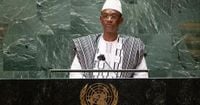On Tuesday, August 19, 2025, Mali’s political landscape was shaken once again as Choguel Kokalla Maïga, the country’s former prime minister, was formally charged with embezzlement of public funds and remanded in custody. The news, confirmed by his lawyer Cheick Oumar Konaré to multiple outlets including The Associated Press and AFP, marks the latest in a series of high-profile detentions under the West African nation’s increasingly authoritarian military junta.
Maïga, 67, served as the civilian head of government from June 2021 until his abrupt dismissal in November 2024. His ouster came just days after he publicly criticized the junta for its repeated delays in organizing elections and its tightening grip on power. Despite being removed from office, Maïga remained one of the regime’s most outspoken critics, continuing to call out what he described as the junta’s lack of transparency and broken promises.
The charges against Maïga stem from a report by Mali’s auditor general scrutinizing his management of public funds during his tenure as prime minister. According to judicial sources cited by France 24 and AFP, the specific accusations include embezzlement of public funds, damage to public property, forgery, and the use of false documents. Eight of Maïga’s former colleagues from his time in office have also been placed in custody, though his former chief of staff was released ahead of trial. As of August 19, no date has been set for Maïga’s trial.
Maïga’s lawyer, Cheick Oumar Konaré, stated to AFP, “We believe in justice, we are calm while awaiting the trial.” He added that Maïga remains composed, emphasizing, “Choguel Maiga says he is calm and believes that a politician should expect anything, including prison and death.” The Supreme Court had formally notified Maïga of the charges after Mali’s prosecutor general filed the case, and ordered his detention pending further proceedings.
Maïga’s arrest did not happen in isolation. Earlier in August, another former prime minister, Moussa Mara, was also imprisoned after posting a message on X (formerly Twitter) expressing support for critics of the junta who had been jailed. Mara’s detention is widely seen as part of a broader crackdown on dissenting voices, with the military rulers showing little tolerance for public criticism or opposition.
The current wave of repression comes against a backdrop of mounting political tension and insecurity in Mali. The country has been ruled by the military since back-to-back coups in 2020 and 2021. Initially, the junta promised a swift return to civilian rule, pledging to hold elections by March 2024. But those promises have repeatedly been broken. In May 2025, the junta dissolved all political parties, further stifling opposition and consolidating its power.
In June 2025, the military-appointed legislative body passed a bill granting Gen. Assimi Goita, the leader of the junta, a five-year presidential mandate. According to France 24, the new law allows Goita to renew his mandate “as many times as necessary” and, notably, without elections. This legislative maneuver has effectively sidelined any meaningful prospect for a return to democratic governance in the near future.
Maïga’s dismissal in November 2024 and subsequent arrest were seen by many as confirmation that the military had no intention of ceding power. After firing Maïga, the junta replaced him with General Abdoulaye Maïga, who had previously served as a government spokesperson. This move, along with a spate of arrests targeting both civilian politicians and military personnel suspected of plotting against the regime, has deepened concerns about the country’s trajectory.
Judicial sources told AFP that Maïga was arrested about a week before the formal charges were announced, just days after the junta carried out dozens of arrests within the army’s ranks to thwart an alleged plot to topple the government. The timing of these actions has fueled suspicions that the corruption charges may be politically motivated, a tool to silence critics and discourage potential challengers.
Mali’s political crisis is compounded by a dire security situation. Since 2012, the country has been plagued by violence from jihadist groups affiliated with al Qaeda and the so-called Islamic State, as well as local criminal gangs. The junta, led by President Goita, has responded by distancing itself from Western partners, notably the former colonial power France, and forging closer ties with Russia. According to France 24, the Malian army and its Russian allies have frequently been accused of committing atrocities against civilians, further tarnishing the government’s image both domestically and abroad.
The junta’s crackdown has not been limited to political figures. In July 2025, a bill passed by the military-appointed legislature granted Goita sweeping powers and the ability to extend his rule indefinitely. The move has been condemned by human rights groups and international observers as a blatant power grab. The regime’s decision to dissolve political parties in May and its ongoing detention of opposition figures have left many Malians with little hope for a return to democratic norms in the near future.
Despite the mounting pressure, Maïga’s legal team remains steadfast. “We believe in justice,” Konaré reiterated, expressing confidence that the legal process would eventually vindicate his client. For now, however, Maïga and his supporters face an uncertain future, as the junta shows no sign of softening its stance.
Maïga’s case has become emblematic of the broader struggle for democracy and civil liberties in Mali. His arrest, and the arrests of other prominent critics, have sent a chilling message to anyone considering speaking out against the military rulers. As the country grapples with ongoing violence, economic hardship, and political repression, many Malians are left wondering when—if ever—the promise of civilian rule and accountable governance will be fulfilled.
For now, Choguel Kokalla Maïga waits in prison, calm but resolute, as the world watches to see whether justice in Mali will ultimately be served—or further subverted by those in power.





